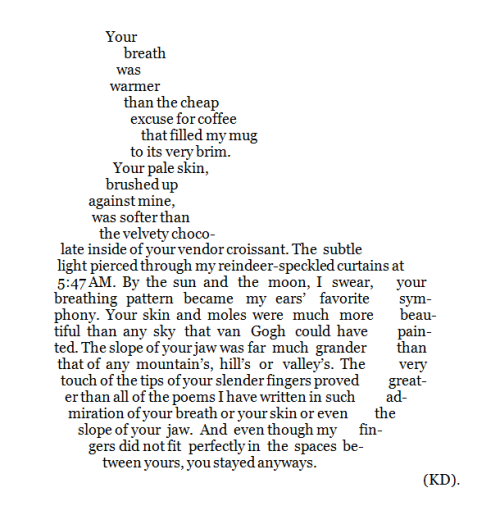by Jane Kenyon (1947-1995)
If many remedies are prescribed for an illness, you may be certain that the illness has no cure.
—A. P. CHEKHOV
The Cherry Orchard
1 FROM THE NURSERY
 |
| Photo by damoiselle at morguefile.com |
When I was born, you waited
behind a pile of linen in the nursery,
and when we were alone, you lay down
on top of me, pressing
the bile of desolation into every pore.
And from that day on
everything under the sun and moon
made me sad -- even the yellow
wooden beads that slid and spun
along a spindle on my crib.
You taught me to exist without gratitude.
You ruined my manners toward God:
"We're here simply to wait for death;
the pleasures of earth are overrated."
I only appeared to belong to my mother,
to live among blocks and cotton undershirts
with snaps; among red tin lunch boxes
and report cards in ugly brown slipcases.
I was already yours -- the anti-urge,
the mutilator of souls.
2 BOTTLES
Elavil, Ludiomil, Doxepin,
Norpramin, Prozac, Lithium, Xanax,
Wellbutrin, Parnate, Nardil, Zoloft.
The coated ones smell sweet or have
no smell; the powdery ones smell
like the chemistry lab at school
that made me hold my breath.
3 SUGGESTION FROM A FRIEND
You wouldn't be so depressed
if you really believed in God.
4 OFTEN
Often I go to bed as soon after dinner
as seems adult
(I mean I try to wait for dark)
in order to push away
from the massive pain in sleep's
frail wicker coracle.
5 ONCE THERE WAS LIGHT
Once, in my early thirties, I saw
that I was a speck of light in the great
river of light that undulates through time.
I was floating with the whole
human family. We were all colors -- those
who are living now, those who have died,
those who are not yet born. For a few
moments I floated, completely calm,
and I no longer hated having to exist.
Like a crow who smells hot blood
you came flying to pull me out
of the glowing stream.
"I'll hold you up. I never let my dear
ones drown!" After that, I wept for days.
6 IN AND OUT
The dog searches until he finds me
upstairs, lies down with a clatter
of elbows, puts his head on my foot.
Sometimes the sound of his breathing
saves my life -- in and out, in
and out; a pause, a long sigh. . . .
7 PARDON
A piece of burned meat
wears my clothes, speaks
in my voice, dispatches obligations
haltingly, or not at all.
It is tired of trying
to be stouthearted, tired
beyond measure.
We move on to the monoamine
oxidase inhibitors. Day and night
I feel as if I had drunk six cups
of coffee, but the pain stops
abruptly. With the wonder
and bitterness of someone pardoned
for a crime she did not commit
I come back to marriage and friends,
to pink fringed hollyhocks; come back
to my desk, books, and chair.
8 CREDO
Pharmaceutical wonders are at work
but I believe only in this moment
of well-being. Unholy ghost,
you are certain to come again.
Coarse, mean, you'll put your feet
on the coffee table, lean back,
and turn me into someone who can't
take the trouble to speak; someone
who can't sleep, or who does nothing
but sleep; can't read, or call
for an appointment for help.
There is nothing I can do
against your coming.
When I awake, I am still with thee.
9 WOOD THRUSH
High on Nardil and June light
I wake at four,
waiting greedily for the first
note of the wood thrush. Easeful air
presses through the screen
with the wild, complex song
of the bird, and I am overcome
by ordinary contentment.
What hurt me so terribly
all my life until this moment?
How I love the small, swiftly
beating heart of the bird
singing in the great maples;
its bright, unequivocal eye.
Source: poets.org
I hope you'll forgive the length of today's offering, because it's a powerful piece. Researchers have found a strong link between depression and creativity, so it's a small wonder that many writers and poets struggle with this illness. Many, like Sylvia Plath, take their own lives. This poet, though she struggled with depression her entire adult life, died of leukemia, not suicide.
Her snapshot approach with the stanzas is striking and worth emulating. When trying to tackle a large topic that has many faces, giving us facets rather than an integrated narrative is quite powerful. That she ends with a scene of finding tranquility and beauty (thanks in part to the medication Nardil, an MAOI) gives the piece a hopeful air. The "unholy ghost" of depression may come again tomorrow, but Kenyon is determined to keep fighting it.
What lines or images stand out to you?































